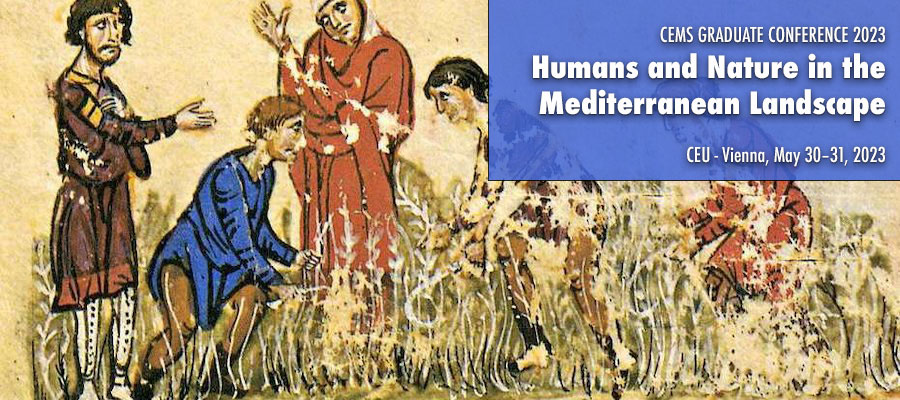Humans and Nature in the Mediterranean Landscape, CEMS Graduate Conference 2023, CEU - Vienna, May 30–31, 2023
The consequences of global warming, pandemics, and ecological catastrophes serve as painful reminders of the contingency of human history on its natural environment. These issues have provided a forceful impetus to the study of history with environmental considerations in mind, leading to what scholars coined as an ecological turn. Since Fernand Braudel, several conceptualizations of the Mediterranean and its surroundings as a subject of historical research emphasized how common patterns of climate, geography, flora, and fauna give rise to shared models of ecology, agriculture, and social organization. Subsequently, environmental history, as well as various approaches centering on the environment in several other disciplines, inspired scholars working on a broad range of topics related to the history of the Mediterranean and led to the emergence of various perspectives on the problems of nature, landscape, sustainability, environment, and ecology.
We would like to highlight the broad variety of approaches to these topics and to show that themes of nature, environment, and ecology are not only a concern of environmental historians, but they could serve as shared spaces of encounter between scholars arriving from an array of backgrounds and disciplines. To this end, we would like to encourage the application of any participants whose interest relates to these fields, even if they don’t consider themselves “environmental historians proper.” Also, we hope to grope toward a conceptualization of the relations between humans and nature, which complements the agricultural and rural focus of the discipline with a thematization of urban landscapes and spaces as parts of ecologies.
We welcome the application of scholars working on but not limited to Anthropology, Archeology, Art History, Classics, Environmental Science and History, Gender Studies, History, Languages and Literatures, Medieval Studies, Early Modern Studies, Philosophy, Religion, and Theology. We hope that this lax interpretation of the boundaries of environmental history will engender new avenues of dialogues on past ecologies that would help participants and audiences think anew and appreciate the diversity of environments and their historical representations in the context of Mediterranean history.
We welcome any topics related but not limited to the following themes and disciplines:
- Climate, climate change and natural catastrophes
- Botanical and meteorological history
- History of ecologies and landscapes
- Landscapes and ecologies as cultural heritage
- Folklores, religions, belief systems and the natural world
- History of sacred spaces and their heritage
- History of agriculture, resource management and sustainability
- History of public health
- History of pandemics and plagues
- Animal history and human-animal relations
- Representations of ecologies, nature, landscapes, animals and pandemics in art, architecture literature.
- History of cosmologies, natural sciences and natural philosophies
- Everyday lives and nature
- History of urban and rural landscapes
- History of things, material history
- History of commerce, trades and industry
- Geo-politics
